Colorado Politics: Hickenlooper “had a hand in several components of the final legislation”
Valley Courier: “Priorities important to Coloradans are reflected throughout the Infrastructure Investment and Jobs Act”
CBS Denver: Hickenlooper “helped negotiate the bill’s passage and says it will fund not only hundreds of road projects but a new runway at DIA and clean drinking water”
In case you missed it, news outlets across Colorado highlighted the role U.S. Senator John Hickenlooper played in getting the Bipartisan Infrastructure Bill signed into law. Hickenlooper was part of a bipartisan group of 22 senators who negotiated and wrote the $1.2 trillion infrastructure bill. He attended the White House signing ceremony on Monday.
The Bipartisan Infrastructure Bill is the largest public investment in infrastructure in a century and the largest climate change bill ever. Also included is Hickenlooper’s RECHARGE Act, which makes it more affordable to drive an electric vehicle and is Hickenlooper’s first bill to become law, as well as provisions Hickenlooper wrote on marijuana, broadband, and RTD.
More than 1,000 people tuned into Hickenlooper’s virtual Town Hall Wednesday night to learn how the Bipartisan Infrastructure Bill will be transformative for Colorado.
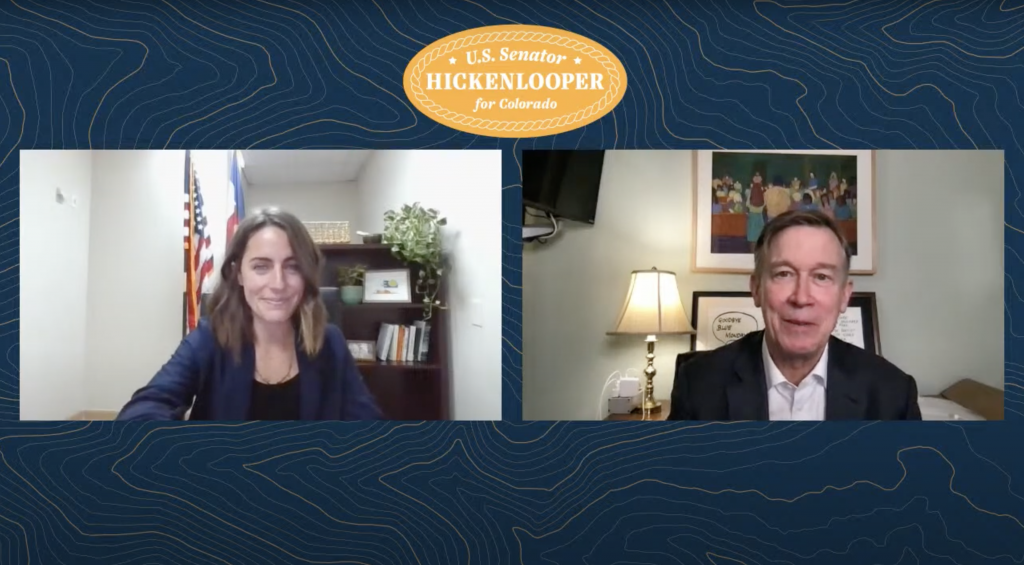
“Make no mistake: the Bipartisan Infrastructure Bill is HUGE! Huge for the country, huge for Colorado, and huge for our democracy,” said Hickenlooper at the Town Hall. “We’re showing all the doubters that when it really matters, we can come together and put points on the board for American people.”
Watch the entire town hall HERE.
Take a look at coverage from across the state:
CBS 4 Denver: New Infrastructure Law Means Nearly $4 Billion For Colorado Roads
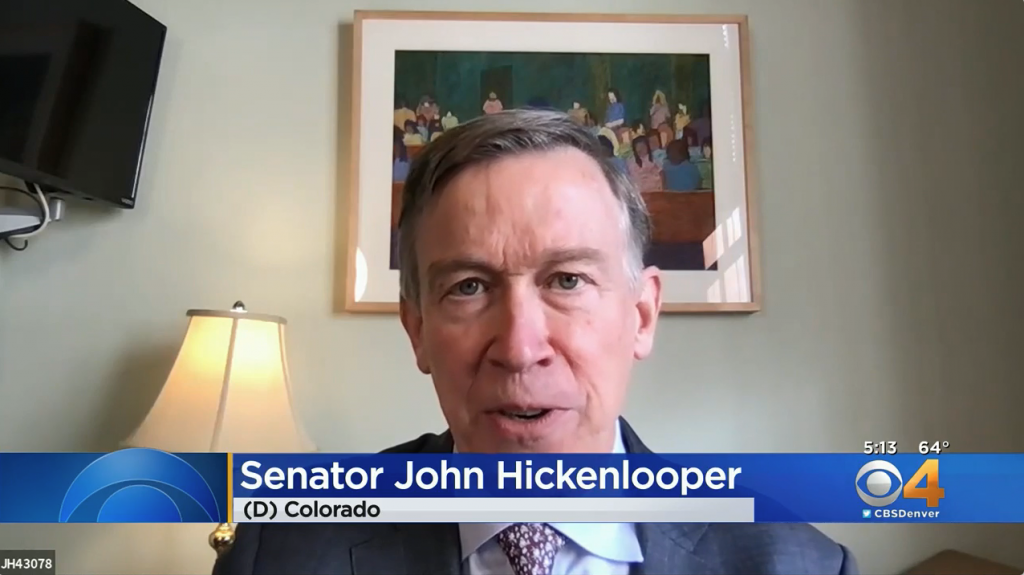
Colorado could receive money from the newly signed infrastructure law as early as next month. While some of the money will be distributed through competitive grant programs next year, the Colorado Department of Transportation will likely see money for road projects right away.
…
“You get a federal investment in infrastructure once in a generation, if you’re lucky,” said Hickenlooper.
He helped negotiate the bill’s passage and says it will fund not only hundreds of road projects but a new runway at DIA and clean drinking water,
“Denver still has too many homes that are getting their domestic water through lead pipes. We know that is not safe and yet Denver Water doesn’t have the resources to do it all at once. This is going to accelerate by 75%-80% how quickly we get those lines converted.”
The law could also speed the transition to electric vehicles. It includes a bill Hickenlooper wrote to make charging more affordable.
It also includes an amendment he introduced requiring the federal government to study the effects of marijuana on driving, “Hopefully we will get something similar to a breathalyzer that’s convenient, that can operate on the roadside and not be overly expensive.”
The law also includes money to upgrade the electricity grid for renewable energy, to clean up abandoned mines, and close the digital divide.
“We got almost everyone connected on broadband in Colorado but they don’t have high-speed internet up and down so they can’t really take advantage of what the internet can provide,” said Hickenlooper. “These are magnificent changes and I think it could very well be transformational.”
Colorado Public Radio: How Colorado’s Democrats have shaped the federal spending bills — and what it might mean for their futures
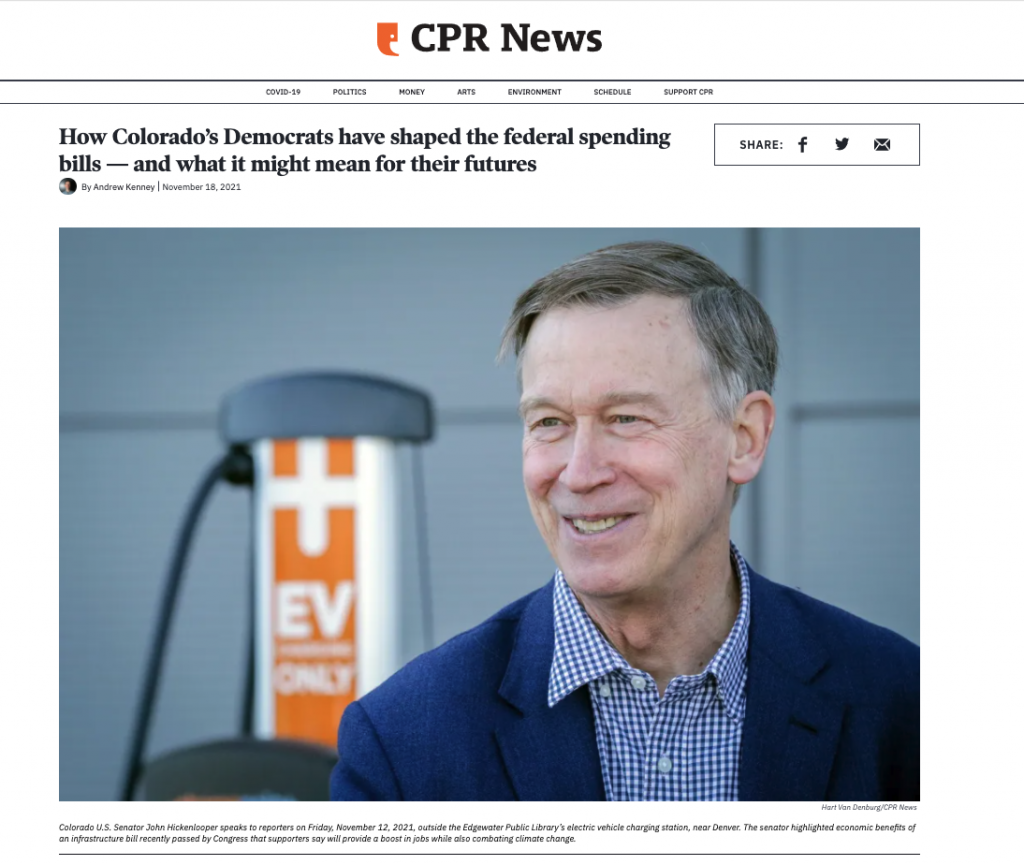
Meanwhile, Rep. Perlmutter pointed to freshman Sen. John Hickenlooper as playing “a big role in getting the terms of the infrastructure bill together.” Hickenlooper was a member of the bipartisan group of 22 senators who negotiated the infrastructure bill.
…
Hickenlooper said he had developed a rapport with Manchin, the conservative West Virginia Democrat who has heavily influenced the bills by threatening to withhold his vote.
“I have a good relationship with Joe Manchin and real respect. I mean, he’s representing … one of the most conservative states in America and in my experience, I think his values are deeply held. He’s very frugal. I’m pretty frugal myself, so we share some of those qualities,” Hickenlooper said.
“We disagree on certain issues, but he’s a listener. And so we’ll see where we get to.”
…
Meanwhile, Hickenlooper backed a law that asks states to voluntarily create more favorable electricity rates for electric-vehicle charging stations.
Durango Herald: Hickenlooper’s first bill becomes law: Making EV charging stations affordable
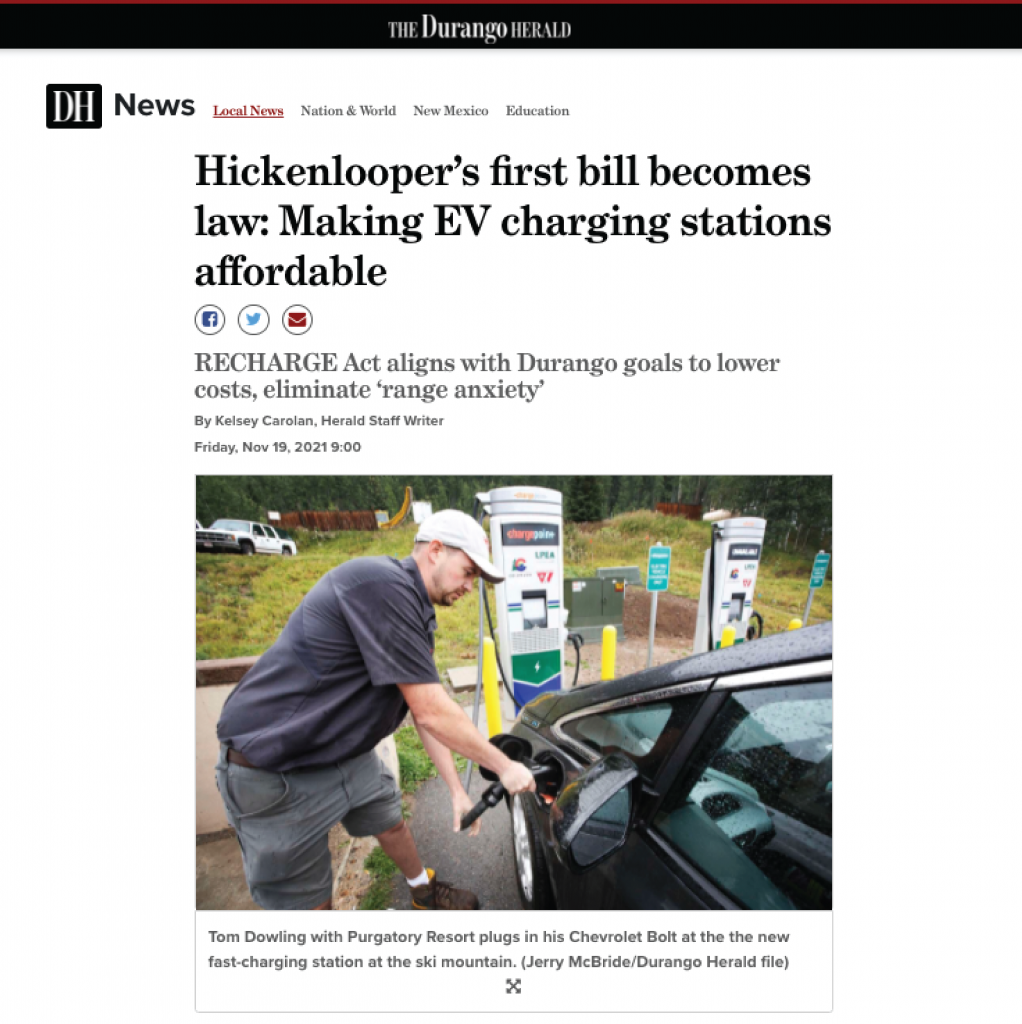
Just as Durango City Council begins to plan for and support the adoption of electric vehicles through its Electric Vehicle Readiness Plan, Sen. John Hickenlooper’s legislation to reduce the costs of driving an electric vehicle became a law.
The RECHARGE Act, Hickenlooper’s first major piece of legislation, requires states to find ways to make it more affordable to drive electric vehicles. Its main goal is to stabilize EV charging rates to promote “greater electrification of the transportation sector.”
…
“To fight climate change, we’ve got to transition to electric vehicles,” Hickenlooper said. “The RECHARGE Act makes it cheaper to drive an EV, and we’re overjoyed that it will be our first bill to become law!”
…
“It’ll have a tremendous impact for rural Colorado because our rates are all over the map. In my particular service area, I serve six small-member co-ops, and their rates and incentives are all over the place,” Dickson said. “These small co-ops are just learning how to adjust their rates to make them equitable for electric vehicles and their charging.”
…
“Hickenlooper’s component on the recharging issue will be beneficial to attract people in electric vehicles, especially those in rural areas where electrification has been slower,” Jackson said.
Denver7 News: Colorado set to receive billions from federal infrastructure package for roads, internet, more
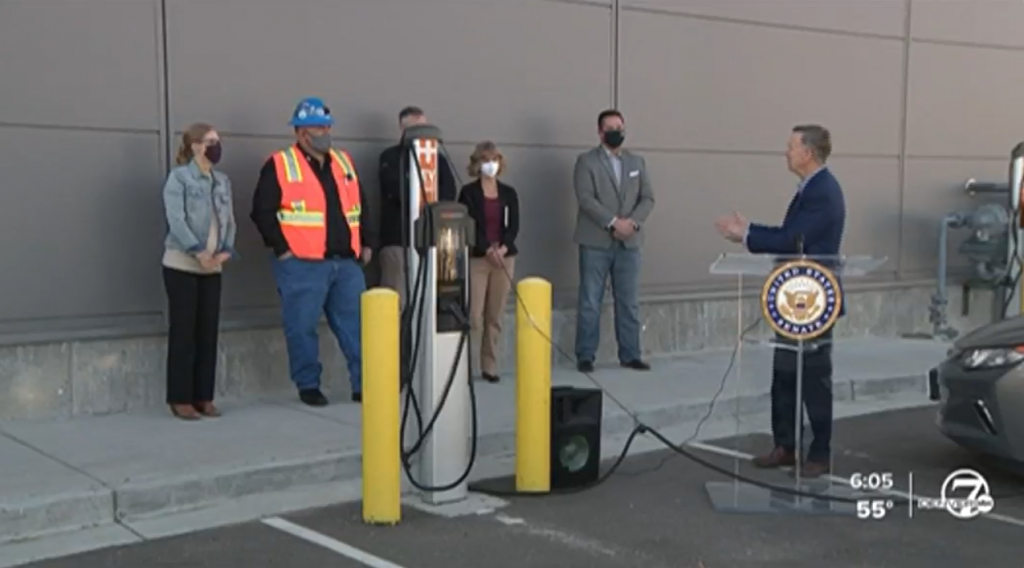
The state is also projected to receive $35 million to protect against wildfires, $16 million to build up cyber security, $688 million to improve water infrastructure and $432 million for airports, among other things.
Hickenlooper’s RECHARGE Act made it into the final version of the bill and is focused on making electric vehicles more affordable.
“I think we’re going to look back 50 years from now and we’re going to say this is the beginning of the great transition,” he said.
It also accelerates the development of more EV charging stations across the country. Colorado is expected to see $57 million over five years in funding for that venture.
“Let’s say 20 years from now we’re going to be all electric vehicles. We have to make sure there’s charging stations and that the grid can handle it,” Hickenlooper said.
Colorado Politics: COVER STORY | Colorado’s Joe Neguse, John Hickenlooper play key roles bringing infrastructure bill to life
Soon after he was sworn into office in January, Hickenlooper, Colorado’s junior senator and a former two-term governor, was asked to join what eventually grew to a group of 22 senators — split evenly between Republicans and Democrats — who negotiated the bill before its passage this summer in the Senate.
Hickenlooper told Colorado Politics his role helping draft the bill began just days after he was elected last November, when Manchin invited him and incoming U.S. Sen. Mark Kelly of Arizona over to talk infrastructure and the legislative process over pizza and beer.
…
Hickenlooper said he learned plenty about the process and didn’t want to overstate his role — noting that his colleagues have much more experience in legislative matters — but acknowledged that he had a hand in several components of the final legislation, including its incorporation of a bill he sponsored to encourage local electrical utilities to offer better prices to consumers when they charge their vehicles.
“We worked so much with broadband (in Colorado) that I was on that little group of people,” he said. “We really went into detail on some of these things. I was very involved with some of the issues around airports. It’s not just (Denver International Airport). We have airports all over the state that need runways or need basic infrastructure, and they’re going to get it.”
Hickenlooper, a former petroleum geologist, added that he’s particularly proud that the bill includes “real money” for capping inactive and abandoned oil and natural gas wells, both as a safety measure and to curb methane emissions, which he boasted builds on a program he pioneered when he was governor.
“It was our work in Colorado that alerted the world to it,” he said, noting that an agreement he brokered between the fossil fuel industry and environmentalists to reduce methane emissions has become the model for regulations adopted worldwide.
“Methane in the first couple of years is 80 to 90 times more polluting, more harmful to the climate, trapping more heat than CO2,” he said. “I was very proud that, as people tried to cut that out a couple of different times, and I was a loud voice — we expanded it to look at coal mines and abandoned mines that are both water pollution and air pollution.”
The Denver Post: Editorial: Biden’s infrastructure package offers a compelling future for America and Congress
Hickenlooper is, as always, optimistic, and his enthusiasm is compelling. The bipartisan bill could spur state and local investments with a transformational effect.
“Fifty years to 100 years from now we are going to call this the Great Transition,” Hickenlooper said. “Where we enter this space of really 8 to 10 years from now, suddenly everyone is going to be buying electric cars, and using electric buses and some may be having all of their electricity being generated by wind, solar, maybe nuclear.”
All of that, Hickenlooper said requires investment in infrastructure.
Alamosa Valley Courier: Bennet and Hickenlooper do Colorado proud in infrastructure bill
Thanks to multiple initiatives led by Colorado U.S. Senator Michael Bennet and Colorado U.S. Senator John Hickenlooper’s role in writing the text of the bill, priorities important to Coloradans are reflected throughout the Infrastructure Investment and Jobs Act (IIJA).
…
Senator Hickenlooper’s provision authorizes the Department of Transportation to return $28.9 million, plus interest, for a deposit that the Regional Transportation District made to secure a federal loan to redevelop Denver’s Union Station. Senator Bennet supported the provision.
Senator Hickenlooper’s RECHARGE Act will make driving an electric vehicle more affordable by having states review utility rates for EV charging.
Transportation safety is an ongoing issue and a provision, written by Hickenlooper, creates a national standard to prevent marijuana-impaired driving, requiring the federal government to recommend ways for researchers to access marijuana samples and study how marijuana impairs driving.
Fox 31 KDVR: Colorado Democrats at infrastructure bill-signing share insight on state plans
Colorado is set to see billions from the federal infrastructure plan, setting up the state for improvements to its roads, light rail and airports.
The trillion-dollar plan is set to allocate about $6 billion in different areas across the state. Colorado lawmakers say projects are expected to get underway starting in 2022.
State and local leaders say the money comes at pivotal time for the state.
“You’ll see the state moving forward rapidly in terms of infrastructure, and I hope that’s a reflection of the whole country moving forward rapidly,” U.S. Senator John Hickenlooper said.
###
